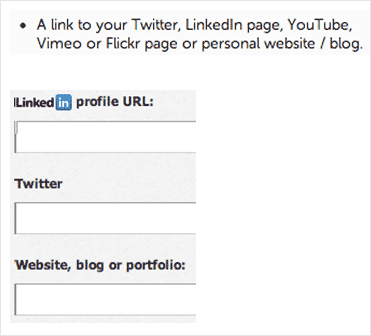Resumé: ‘a brief account of one’s professional or work experience and qualifications, often submitted with an employment application’
The resumé is an integral part of today’s business world and absolutely an expectation of anyone seeking employment. The resumé-writing industry itself is chock full of self-help books, interactive seminars, and courses in schools all over the world. A resumé is non-negotiable. But it wasn’t always this way, and I believe it won’t always be this way either.
From the days of Leonardo da Vinci to broadband Internet access today, the resumé has grown and evolved. With the new medium of the Internet, the resumé stands to change again.
From the days of Leonardo da Vinci to broadband Internet access today, the resumé has grown and evolved. With the new medium of the Internet, the resumé stands to change again.
A Brief History of the Resumé
- Leonardo da Vinci wrote the first recorded resumé in 1482.
- The word resumé was first used to describe a letter of introduction.
- In the early 1900’s resumés were a very informal and non-required process.
- In the 1940’s resumés included height, age, weight, marital status, and religion.
- The 1950’s saw resumés become expected in the workplace.
- The 1970’s saw more professionally designed and sales oriented resumés.
- The 1990’s saw the Internet, Monster.com, and email change the resumé landscape.
Resumés are now flown around the world millions of times a day, delivered in mailboxes, inboxes, online job sites like FreshGigs.ca, company websites, and in person. Resumés are truly a staple of the job economy.
What is the Purpose of a Resumé?
The purpose of a resumé, consistent with the Canadian government, U.S. government, and several educational institutions, is quite simply to get an interview. The purpose of a resumé is not to get a job. Unfortunately, that comes later!
A resumé should contain relevant work experience, education, skills, and any additional experience you think is relevant for the job. It is a standardized document that showcases to the potential employer your ability to do the advertised job.
The mega-growth resumé coaching and self-help industry of the mid 1980’s as well as the rush of standardization of the resumé as a vehicle to gain employment has resulted in the resumé becoming less effective as it used to be.
But Standardizing Isn’t Enough
As with many products with a similar level of growth (with the exception of systems that benefit from network effects – most notably, the Internet), the more users participate, the less effective the medium. Simply having a resumé in the early 1900’s was enough to stand out. In the 1930’s, similarly, creating an in-depth, professional looking resumé was enough to stand out.
The mega-growth resumé coaching and self-help industry of the mid 1980’s as well as the rush of standardization of the resumé as a vehicle to gain employment has resulted in the resumé becoming less effective as it used to be.
The Rise of the Internet
We all know the story of the Internet and it’s spectacular rise. But the Internet itself hasn’t changed the dynamics of the resumé as much as what followed the Internet.
Search. Networks. Facebook. Social Media.
If you believe that a resumé in today’s world is good enough in itself to acquire an interview, I would have to disagree with you. Of course there are cases where this works but I see the general trend as moving more and more to the Internet.
The reason for this is simple. When was the last time you wanted to learn something without turning to the Internet to find the answer? With social everything nowadays, what are the changes a potential employer won’t take a few minutes to try to find your presence online?
The odds are low; it’s even a requirement for some jobs that you add your Internet presence to their application. Here are two examples I found in 5 minutes.
5 Things You Can Do Right Now To Secure Your Internet Presence
If we accept that potential employers are going to look at our web presence before hiring us, then it follows that we should manage the information that’s out there. I like to think of my online presence as just as much of a resumé as the one I have in a Word document on my computer. One is simply not enough anymore. We must concentrate on perfecting both the ‘paper’ and ‘online’ resumés to achieve the best results.
Here are 5 tips to secure your Internet presence.
1. Purchase Your Domain Name
And also purchase all variants of it that you think are most relevant. I make sure to purchase my own name for the most common domains (.com, .ca, .net, etc). I can build an online resumé, post accomplishments and projects, and strategize the message I want to put across.
Even if you decide to not put anything on your domain at this time, purchasing it is a practice in security. If your name is unclaimed, anybody can purchase the rights to it. It’s best to control your name.
An easy way to do this: go to dreamhost.com (my preferred, but any registrar will do) and purchase a domain for approximately $10 per year. When you do decide to put up a website, reliable hosting is approximately $7/month. Easy.
2. Start a Blog
A blog is the easiest way to get your opinions, wisdom and unique thoughts out there for the world to see. Reading a few of your blog entries, I argue, would tell a potential hirer much more about you than a resumé or even interview would. Blogs are also a marketing vehicle in their own right and can promote your personal brand.
Starting a blog is easy. Dreamhost (although all of the other major providers will provide this service as well) provides a 1 click install of WordPress – one of the world’s most popular website, blog, and content management platforms. WordPress is dead simple; you can be up and running in no time at all.
Mark your territory and guard it closely; as more and more employers turn to the Internet, your image will become all the more important.
3. Clean Up Your Social Profiles|
We’ve all had those photos we wish were never taken show up on Facebook the next day. Whether you go through your history and delete experiences you’d prefer to be private, or simply update your privacy settings to the maximum, make sure you take the time to manage your social profiles.
4. Participate in Discussions
Participating in online groups and discussions is a great way to enhance your personal brand and engage in networking. It is highly likely that the type of companies you want to work for engage in some time of online activity. If, for example, you’re a website conversion expert, you may want to contribute to relevant blogs, participate in LinkedIn groups, Facebook fan pages, Google Circles, and other discussion boards that speak on your topic.
5. Get Recommendations
Being recommended is one of the most powerful ways to illicit trust and competence. There’s a reason you see testimonials on every web site selling a product – they really do increase conversion. If you have several glowing recommendations on your personal website or even on your resumé they will go a long way to getting you a new job.
Breathe Life Into Your Resumé
The resumé will continue to be an important tool in your job search. Not every company will be interested in your Internet presence…yet. But that number will rise every year as the Internet continues to permeate our everyday life.
Supplement your resumé with your online presence. Make it consistent – demonstrate that you are who you say you are, on paper and on the Internet. Mark your territory and guard it closely; as more and more employers turn to the Internet, your image will become all the more important.

